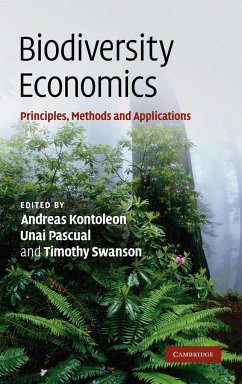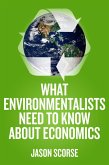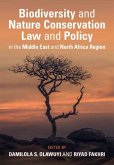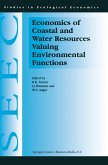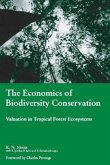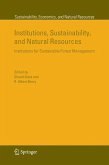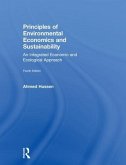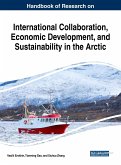Andreas Kontoleon / Unai Pascual / Timothy Swanson (eds.)Principles, Methods and Applications
Biodiversity Economics
Principles, Methods and Applications
Herausgeber: Kontoleon, Andreas; Swanson, Timothy; Pascual, Unai
Andreas Kontoleon / Unai Pascual / Timothy Swanson (eds.)Principles, Methods and Applications
Biodiversity Economics
Principles, Methods and Applications
Herausgeber: Kontoleon, Andreas; Swanson, Timothy; Pascual, Unai
- Gebundenes Buch
- Merkliste
- Auf die Merkliste
- Bewerten Bewerten
- Teilen
- Produkt teilen
- Produkterinnerung
- Produkterinnerung
Human induced biodiversity loss is greater now than at any time in human history, with extinctions occurring at rates hundreds of times higher than background extinction levels. The field of biodiversity economics analyses the socio-economic causes of and solutions to biodiversity loss by combining the disciplines of economics, ecology and biology. This field has shown a remarkable degree of transformation over the past four decades and now incorporates the analysis of the entire diversity of biological resources within the living world. Biodiversity Economics presents a series of papers that…mehr
Andere Kunden interessierten sich auch für
![What Environmentalists Need to Know about Economics What Environmentalists Need to Know about Economics]() Jason ScorseWhat Environmentalists Need to Know about Economics39,99 €
Jason ScorseWhat Environmentalists Need to Know about Economics39,99 €![Biodiversity and Nature Conservation Law and Policy in the Middle East and North Africa Region Biodiversity and Nature Conservation Law and Policy in the Middle East and North Africa Region]() Biodiversity and Nature Conservation Law and Policy in the Middle East and North Africa Region118,99 €
Biodiversity and Nature Conservation Law and Policy in the Middle East and North Africa Region118,99 €![Economics of Coastal and Water Resources: Valuing Environmental Functions Economics of Coastal and Water Resources: Valuing Environmental Functions]() Economics of Coastal and Water Resources: Valuing Environmental Functions121,99 €
Economics of Coastal and Water Resources: Valuing Environmental Functions121,99 €![The Economics of Biodiversity Conservation The Economics of Biodiversity Conservation]() Institute for Social and Economic ChangeThe Economics of Biodiversity Conservation216,99 €
Institute for Social and Economic ChangeThe Economics of Biodiversity Conservation216,99 €![Institutions, Sustainability, and Natural Resources Institutions, Sustainability, and Natural Resources]() Institutions, Sustainability, and Natural Resources116,99 €
Institutions, Sustainability, and Natural Resources116,99 €![Principles of Environmental Economics and Sustainability Principles of Environmental Economics and Sustainability]() Ahmed HussenPrinciples of Environmental Economics and Sustainability197,99 €
Ahmed HussenPrinciples of Environmental Economics and Sustainability197,99 €![Handbook of Research on International Collaboration, Economic Development, and Sustainability in the Arctic Handbook of Research on International Collaboration, Economic Development, and Sustainability in the Arctic]() Handbook of Research on International Collaboration, Economic Development, and Sustainability in the Arctic302,99 €
Handbook of Research on International Collaboration, Economic Development, and Sustainability in the Arctic302,99 €-
-
-
Human induced biodiversity loss is greater now than at any time in human history, with extinctions occurring at rates hundreds of times higher than background extinction levels. The field of biodiversity economics analyses the socio-economic causes of and solutions to biodiversity loss by combining the disciplines of economics, ecology and biology. This field has shown a remarkable degree of transformation over the past four decades and now incorporates the analysis of the entire diversity of biological resources within the living world. Biodiversity Economics presents a series of papers that show how bio-economic analysis can be applied to the examination and evaluation of the problem of various forms of biodiversity loss. Containing state-of-the-art bio-economic research by some of the leading practitioners in the field, this volume will be an essential research tool to those working on biodiversity issues in the academic, policy and private sectors.
Hinweis: Dieser Artikel kann nur an eine deutsche Lieferadresse ausgeliefert werden.
Hinweis: Dieser Artikel kann nur an eine deutsche Lieferadresse ausgeliefert werden.
Produktdetails
- Produktdetails
- Verlag: Cambridge University Press
- Seitenzahl: 692
- Erscheinungstermin: 30. Juni 2010
- Englisch
- Abmessung: 235mm x 157mm x 45mm
- Gewicht: 1257g
- ISBN-13: 9780521866835
- ISBN-10: 0521866839
- Artikelnr.: 23073483
- Herstellerkennzeichnung
- Libri GmbH
- Europaallee 1
- 36244 Bad Hersfeld
- gpsr@libri.de
- Verlag: Cambridge University Press
- Seitenzahl: 692
- Erscheinungstermin: 30. Juni 2010
- Englisch
- Abmessung: 235mm x 157mm x 45mm
- Gewicht: 1257g
- ISBN-13: 9780521866835
- ISBN-10: 0521866839
- Artikelnr.: 23073483
- Herstellerkennzeichnung
- Libri GmbH
- Europaallee 1
- 36244 Bad Hersfeld
- gpsr@libri.de
Andreas Kontoleon is University Lecturer in the Department of Land Economy, University of Cambridge.
Unai Pascual is University Lecturer in the Department of Land Economy, University of Cambridge.
Timothy Swanson is Chair in Law and Economics at the Department of Economics and Faculty of Law, University College London.
Unai Pascual is University Lecturer in the Department of Land Economy, University of Cambridge.
Timothy Swanson is Chair in Law and Economics at the Department of Economics and Faculty of Law, University College London.
List of figures; List of contributors; Preface; Acknowledgements; Foreword
Jeffrey A. McNeely; Introduction Andreas Kontoleon, Unai Pascual and
Timothy Swanson; 1. Do we really care about biodiversity? David W. Pearce;
Part I. Causes of Biodiversity Loss: A. Land Conversion: 2. The economics
of land conversion, open access and biodiversity loss Edward B. Barbier; 3.
Estimating spatial interactions in deforestation decisions Juan Robalino,
Alexander Pfaff and Arturo Sanchez-Azofeifa; 4. Resource exploitation,
biodiversity and ecological events Yacov Tsur and Amos Zemel; B. Invasives:
5. Pests pathogens and poverty: biological invasions and agricultural
dependence Charles Perrings; 6. Prevention versus control in Invasive
Species Management David Finnoff, Jason F. Shogren, Brian Leung and David
Lodge; C. International Trade: 7. Trade and renewable resources in a
second-best world: an overview Erwin Bulte and Ed Barbier; 8. International
trade and its impact on biological diversity Rafat Alam and Nguyen V Quyen;
Part II. The Value of Biodiversity: A. Concepts: 9. Designing the legacy
library of genetic resources: approaches, methods, and results Tim Swanson
and Timo Goeschl; 10. Why the measurement of species diversity requires
prior value judgments Stefan Baumgärtner; B. Techniques: 11. Combining TCM
and CVM of endangered species conservation program: estimation of the
marginal value of vultures (Gyps fulvus) in the presence of
species-visitors interaction Nir Becker, Yael Choresh, Moshe Inbar and Ofer
Bahat; 12. Valuing ecological and anthropocentric concepts of biodiversity:
a choice experiments application Michael Christie and Nick Hanley, John
Warren, Tony Hyde, Kevin Murphy and Robert Wright; 13. Spatially explicit
choice experiments: a case of multiple-use management of forest recreation
sites Paula Horne, Peter Boxall and Wiktor Adamowicz; Part III. Policies
for Biodiversity Conservation: A. Contracts: 14. Auctioning biodiversity
conservation contracts Gary Stoneham, Vivek Chaudhri, Loris Strappazzon and
Arthur Ha; 15. An evolutionary institutional approach to the economics of
bioprospection Tom Dedeurwaerdere, Vijesh Krishna and Unai Pascual; 16. An
ecological economic programming approach to modelling landscape level
biodiversity conservation Ernst-August Nuppenau and Marc Helmer; B.
Implementation: 17. The effectiveness of centralized and decentralized
institutions in managing biodiversity: lessons from economic experiments
Jana Vyrastekova and Daan van Soest; 18. Conserving species in a working
landscape: land use with biological and economic objectives Steve Polasky,
Erik Nelson, Eric Lonsdorf, Paul Fackler and Anthony Starfield; 19.
Balancing recreation and wildlife conservation of charismatic species Doris
Behrens and Birgit Friedl; 20. Modelling the re-colonisation of native
species Anders Skonhoft; Part IV. Managing Agro-Biodiversity: Causes,
Values and Policies: 21. On the role of crop biodiversity in the management
of environmental risk Salvatore Di Falco and Jean-Paul Chavas; 22.
Assessing the private value of agro-biodiversity in Hungarian home gardens
using the data enrichment method Ekin Birol, Andreas Kontoleon and Melinda
Smale; 23. Agricultural development and the diversity of crop and livestock
genetic resources: a review of the economics literature Melinda Smale and
Adam Drucker; Index.
Jeffrey A. McNeely; Introduction Andreas Kontoleon, Unai Pascual and
Timothy Swanson; 1. Do we really care about biodiversity? David W. Pearce;
Part I. Causes of Biodiversity Loss: A. Land Conversion: 2. The economics
of land conversion, open access and biodiversity loss Edward B. Barbier; 3.
Estimating spatial interactions in deforestation decisions Juan Robalino,
Alexander Pfaff and Arturo Sanchez-Azofeifa; 4. Resource exploitation,
biodiversity and ecological events Yacov Tsur and Amos Zemel; B. Invasives:
5. Pests pathogens and poverty: biological invasions and agricultural
dependence Charles Perrings; 6. Prevention versus control in Invasive
Species Management David Finnoff, Jason F. Shogren, Brian Leung and David
Lodge; C. International Trade: 7. Trade and renewable resources in a
second-best world: an overview Erwin Bulte and Ed Barbier; 8. International
trade and its impact on biological diversity Rafat Alam and Nguyen V Quyen;
Part II. The Value of Biodiversity: A. Concepts: 9. Designing the legacy
library of genetic resources: approaches, methods, and results Tim Swanson
and Timo Goeschl; 10. Why the measurement of species diversity requires
prior value judgments Stefan Baumgärtner; B. Techniques: 11. Combining TCM
and CVM of endangered species conservation program: estimation of the
marginal value of vultures (Gyps fulvus) in the presence of
species-visitors interaction Nir Becker, Yael Choresh, Moshe Inbar and Ofer
Bahat; 12. Valuing ecological and anthropocentric concepts of biodiversity:
a choice experiments application Michael Christie and Nick Hanley, John
Warren, Tony Hyde, Kevin Murphy and Robert Wright; 13. Spatially explicit
choice experiments: a case of multiple-use management of forest recreation
sites Paula Horne, Peter Boxall and Wiktor Adamowicz; Part III. Policies
for Biodiversity Conservation: A. Contracts: 14. Auctioning biodiversity
conservation contracts Gary Stoneham, Vivek Chaudhri, Loris Strappazzon and
Arthur Ha; 15. An evolutionary institutional approach to the economics of
bioprospection Tom Dedeurwaerdere, Vijesh Krishna and Unai Pascual; 16. An
ecological economic programming approach to modelling landscape level
biodiversity conservation Ernst-August Nuppenau and Marc Helmer; B.
Implementation: 17. The effectiveness of centralized and decentralized
institutions in managing biodiversity: lessons from economic experiments
Jana Vyrastekova and Daan van Soest; 18. Conserving species in a working
landscape: land use with biological and economic objectives Steve Polasky,
Erik Nelson, Eric Lonsdorf, Paul Fackler and Anthony Starfield; 19.
Balancing recreation and wildlife conservation of charismatic species Doris
Behrens and Birgit Friedl; 20. Modelling the re-colonisation of native
species Anders Skonhoft; Part IV. Managing Agro-Biodiversity: Causes,
Values and Policies: 21. On the role of crop biodiversity in the management
of environmental risk Salvatore Di Falco and Jean-Paul Chavas; 22.
Assessing the private value of agro-biodiversity in Hungarian home gardens
using the data enrichment method Ekin Birol, Andreas Kontoleon and Melinda
Smale; 23. Agricultural development and the diversity of crop and livestock
genetic resources: a review of the economics literature Melinda Smale and
Adam Drucker; Index.
List of figures; List of contributors; Preface; Acknowledgements; Foreword
Jeffrey A. McNeely; Introduction Andreas Kontoleon, Unai Pascual and
Timothy Swanson; 1. Do we really care about biodiversity? David W. Pearce;
Part I. Causes of Biodiversity Loss: A. Land Conversion: 2. The economics
of land conversion, open access and biodiversity loss Edward B. Barbier; 3.
Estimating spatial interactions in deforestation decisions Juan Robalino,
Alexander Pfaff and Arturo Sanchez-Azofeifa; 4. Resource exploitation,
biodiversity and ecological events Yacov Tsur and Amos Zemel; B. Invasives:
5. Pests pathogens and poverty: biological invasions and agricultural
dependence Charles Perrings; 6. Prevention versus control in Invasive
Species Management David Finnoff, Jason F. Shogren, Brian Leung and David
Lodge; C. International Trade: 7. Trade and renewable resources in a
second-best world: an overview Erwin Bulte and Ed Barbier; 8. International
trade and its impact on biological diversity Rafat Alam and Nguyen V Quyen;
Part II. The Value of Biodiversity: A. Concepts: 9. Designing the legacy
library of genetic resources: approaches, methods, and results Tim Swanson
and Timo Goeschl; 10. Why the measurement of species diversity requires
prior value judgments Stefan Baumgärtner; B. Techniques: 11. Combining TCM
and CVM of endangered species conservation program: estimation of the
marginal value of vultures (Gyps fulvus) in the presence of
species-visitors interaction Nir Becker, Yael Choresh, Moshe Inbar and Ofer
Bahat; 12. Valuing ecological and anthropocentric concepts of biodiversity:
a choice experiments application Michael Christie and Nick Hanley, John
Warren, Tony Hyde, Kevin Murphy and Robert Wright; 13. Spatially explicit
choice experiments: a case of multiple-use management of forest recreation
sites Paula Horne, Peter Boxall and Wiktor Adamowicz; Part III. Policies
for Biodiversity Conservation: A. Contracts: 14. Auctioning biodiversity
conservation contracts Gary Stoneham, Vivek Chaudhri, Loris Strappazzon and
Arthur Ha; 15. An evolutionary institutional approach to the economics of
bioprospection Tom Dedeurwaerdere, Vijesh Krishna and Unai Pascual; 16. An
ecological economic programming approach to modelling landscape level
biodiversity conservation Ernst-August Nuppenau and Marc Helmer; B.
Implementation: 17. The effectiveness of centralized and decentralized
institutions in managing biodiversity: lessons from economic experiments
Jana Vyrastekova and Daan van Soest; 18. Conserving species in a working
landscape: land use with biological and economic objectives Steve Polasky,
Erik Nelson, Eric Lonsdorf, Paul Fackler and Anthony Starfield; 19.
Balancing recreation and wildlife conservation of charismatic species Doris
Behrens and Birgit Friedl; 20. Modelling the re-colonisation of native
species Anders Skonhoft; Part IV. Managing Agro-Biodiversity: Causes,
Values and Policies: 21. On the role of crop biodiversity in the management
of environmental risk Salvatore Di Falco and Jean-Paul Chavas; 22.
Assessing the private value of agro-biodiversity in Hungarian home gardens
using the data enrichment method Ekin Birol, Andreas Kontoleon and Melinda
Smale; 23. Agricultural development and the diversity of crop and livestock
genetic resources: a review of the economics literature Melinda Smale and
Adam Drucker; Index.
Jeffrey A. McNeely; Introduction Andreas Kontoleon, Unai Pascual and
Timothy Swanson; 1. Do we really care about biodiversity? David W. Pearce;
Part I. Causes of Biodiversity Loss: A. Land Conversion: 2. The economics
of land conversion, open access and biodiversity loss Edward B. Barbier; 3.
Estimating spatial interactions in deforestation decisions Juan Robalino,
Alexander Pfaff and Arturo Sanchez-Azofeifa; 4. Resource exploitation,
biodiversity and ecological events Yacov Tsur and Amos Zemel; B. Invasives:
5. Pests pathogens and poverty: biological invasions and agricultural
dependence Charles Perrings; 6. Prevention versus control in Invasive
Species Management David Finnoff, Jason F. Shogren, Brian Leung and David
Lodge; C. International Trade: 7. Trade and renewable resources in a
second-best world: an overview Erwin Bulte and Ed Barbier; 8. International
trade and its impact on biological diversity Rafat Alam and Nguyen V Quyen;
Part II. The Value of Biodiversity: A. Concepts: 9. Designing the legacy
library of genetic resources: approaches, methods, and results Tim Swanson
and Timo Goeschl; 10. Why the measurement of species diversity requires
prior value judgments Stefan Baumgärtner; B. Techniques: 11. Combining TCM
and CVM of endangered species conservation program: estimation of the
marginal value of vultures (Gyps fulvus) in the presence of
species-visitors interaction Nir Becker, Yael Choresh, Moshe Inbar and Ofer
Bahat; 12. Valuing ecological and anthropocentric concepts of biodiversity:
a choice experiments application Michael Christie and Nick Hanley, John
Warren, Tony Hyde, Kevin Murphy and Robert Wright; 13. Spatially explicit
choice experiments: a case of multiple-use management of forest recreation
sites Paula Horne, Peter Boxall and Wiktor Adamowicz; Part III. Policies
for Biodiversity Conservation: A. Contracts: 14. Auctioning biodiversity
conservation contracts Gary Stoneham, Vivek Chaudhri, Loris Strappazzon and
Arthur Ha; 15. An evolutionary institutional approach to the economics of
bioprospection Tom Dedeurwaerdere, Vijesh Krishna and Unai Pascual; 16. An
ecological economic programming approach to modelling landscape level
biodiversity conservation Ernst-August Nuppenau and Marc Helmer; B.
Implementation: 17. The effectiveness of centralized and decentralized
institutions in managing biodiversity: lessons from economic experiments
Jana Vyrastekova and Daan van Soest; 18. Conserving species in a working
landscape: land use with biological and economic objectives Steve Polasky,
Erik Nelson, Eric Lonsdorf, Paul Fackler and Anthony Starfield; 19.
Balancing recreation and wildlife conservation of charismatic species Doris
Behrens and Birgit Friedl; 20. Modelling the re-colonisation of native
species Anders Skonhoft; Part IV. Managing Agro-Biodiversity: Causes,
Values and Policies: 21. On the role of crop biodiversity in the management
of environmental risk Salvatore Di Falco and Jean-Paul Chavas; 22.
Assessing the private value of agro-biodiversity in Hungarian home gardens
using the data enrichment method Ekin Birol, Andreas Kontoleon and Melinda
Smale; 23. Agricultural development and the diversity of crop and livestock
genetic resources: a review of the economics literature Melinda Smale and
Adam Drucker; Index.

